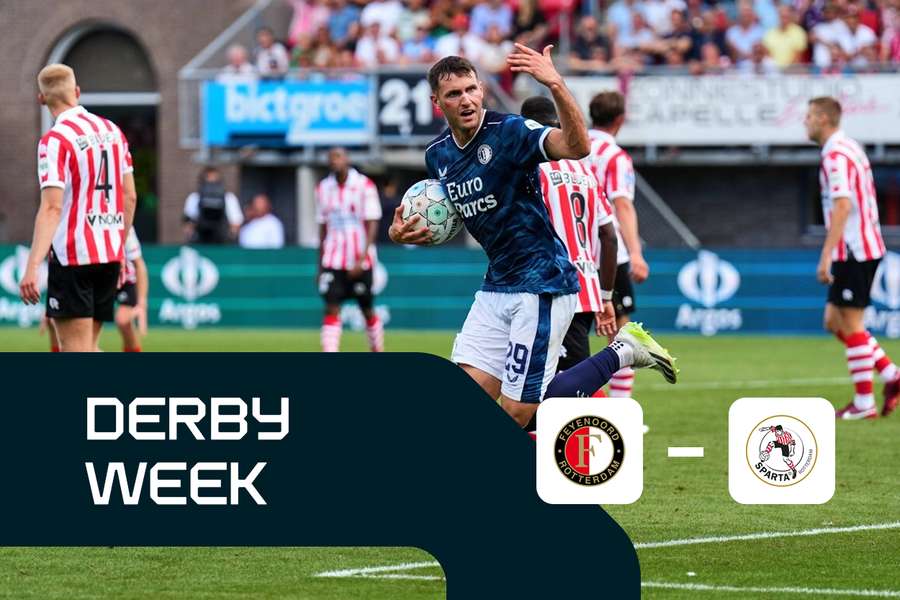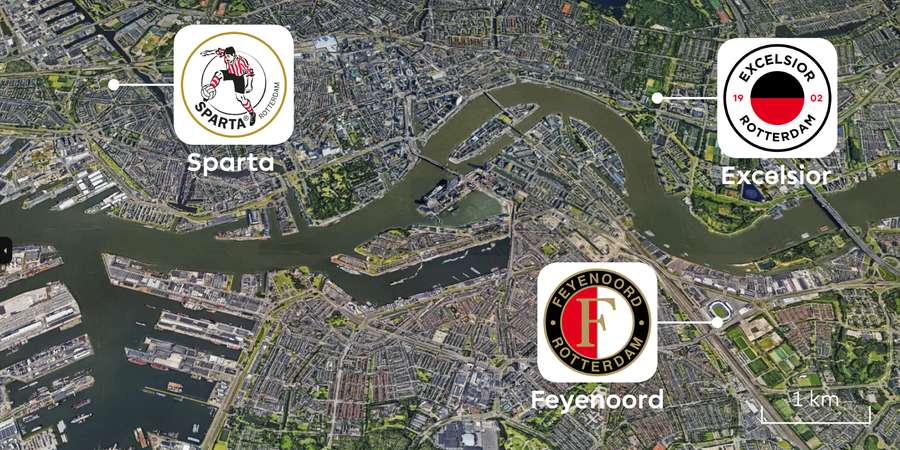Derby Week: Success vs tradition and workers vs the elite in the Rotterdam derby

Dutch football is dominated by three clubs from three major cities. Ajax from Amsterdam have won 36 titles, PSV Eindhoven 24 and the third most successful team is Rotterdam's Feyenoord, who are also the reigning national champions. Last season they won their 16th title.
Other teams from Rotterdam have also managed to win the Eredivisie, right from the inaugural season in 1888/89, which was dominated by VV Concordia. Sparta Rotterdam soon joined them in the top flight and are considered the oldest still-functioning club in the country.

They achieved their greatest success in the period shortly before the First World War, winning five titles in seven seasons from 1908 to 1915. After that, they became champions just once more in their history, in 1959, but have regularly been a top-flight club with the exception of a few years in the 2000s and 2010s.
In recent years, they've found themselves back at the business end of the table, finishing in sixth place last season and only narrowly missing out on a spot in the Conference League.
The third of the Rotterdam representatives in the Eredivisie are Excelsior, but they've never achieved the same success as Feyenoord and Sparta, instead going back and forth between the first and second flight for a long time.
Innovative Sparta
Sparta Rotterdam have been inspired from their earliest days by the home of football, England. The club's colours were taken from Sunderland, who were one of the best teams in the country in the late 19th and early 20th century. Representatives of Sparta Rotterdam were so fascinated by Sunderland that after one of their visits to the club in the north of England, they took an old set of their jerseys home. Since then, Sparta have adopted the same colours and style as Sunderland - red and white vertical striped shirts and black shorts.
Apart from the colour of the shirts and the way of playing, Sparta Rotterdam also took other ideas and innovations from England. They were the first in the Netherlands (and possibly in continental Europe) to think that players should be allowed to head the ball, and they also introduced fixed crossbars to replace the strings stretched between the sticks and put nets around the goals. Another innovative step was the attempt to develop women's football at the same time at the end of the 19th century.
The burial of Excelsior's soul
In addition to the 16 league trophies, Feyenoord's trophy cabinet also contains 13 Dutch Cups, four domestic Super Cups and perhaps their greatest achievements: their triumphs in the European Champions Cup (1970) and the UEFA Cup (1974, 2002).
Their rise to the top is partly down to Excelsior. There is a long-standing partnership between the two clubs, with the Dutch giants often letting their players play on loan at the neighbouring club and are given first dibs on promising Excelsior players including Robin van Persie.
The two clubs are linked not only by this but also by the structure of their fan bases, which both come from parts of the city that used to be working-class neighbourhoods. Even nowadays, they both still present themselves as the working man's club.
Despite their links, there is a certain rivalry between them. The cooperation between the two is a thorn in the side of traditional Excelsior fans. Their club has a longer history and they don't like to serve as a "B" team. They even staged a "funeral" in 2009 - when the partnership between the two neighbouring clubs intensified - during which they buried the figurative identity of their club, which they claimed had died.
In terms of competition within the country, Feyenoord have bigger rivals in Ajax and PSV, with whom they form the so-called Big Three But after that, their biggest rival is clearly Sparta.
Resentment against Sparta originated in the case of Feyenoord, but also Excelsior, at the beginning of the 20th century. This was firstly due to the fact that Sparta were very successful at the time in sporting terms, but secondly - and most importantly - it was because it was a club of the social elite, the upper class. The strained relations with the traditionally working-class teams Feyenoord and Excelsior persist to this day.
Feyenoord and Sparta are the biggest clubs in the city and will face off in Rotterdam on Sunday, February 11th at 20:00 CET. You can follow the match live on Flashscore.
Other derbies this week
Wednesday, February 7th
Brazil - Campeonato Paulista
Classico Alvinegro
Corinthians and Santos are two of the biggest and most successful clubs from Sao Paolo, a megalopolis of more than 20 million people, making it one of the biggest cities in the world. As the club colours of both clubs are white and black, they compete against each other in what is known as the White and Black Classic.
Thursday, February 8th
Brazil - Campeonato Carioca
Classico da Rivalidade
The derby between Flamengo and Botafogo, two clubs from Rio de Janeiro, is one of the biggest rivalries within Brazilian football. The two teams have played each other 381 times; Flamengo has 143 wins while Botafogo have beaten their rival on 114 occasions.
Saturday, February 10th
Spain - Segunda Division
Derbi Asturiano
The passionate Asturian derby was the subject of Derby Week the last time these two regional rivals from the north of Spain clashed. Back in September, the match ended 0-0. Each time, it's a very tough battle rather than a display of beautiful football - there have never been more than two goals in 10 derbies in a row.
Switzerland - Super League
Zurcher derby (Zurich derby)
It's only been two weeks since the city rivals from Zurich, FC Zurich and Grasshoppers, met last. The match ended 2-1 to the Grasshoppers. The first time these two very traditional and also successful clubs clashed was back in 1897. The next derby will be number 254.
Sunday, February 11th
Peru - Primera Division
Alianza Lima - Universitario de Deportes
El Clasico Peruano (Peruvian Clasico)
Alianza Lima and Universitario de Deportes are the two biggest and most successful Peruvian clubs. Both are also based in the capital city of Lima. Alianza have 25 titles to their name, while Universitario have 27. The last one was won in November 2023, when they defeated their rivals in the playoff final.
Netherlands - Eredivisie
IJsselderby (IJssel River Derby)
The Dutch province of Overijsselse currently has four representatives (out of 18) in the top flight: FC Twente, PECZwolle, Heracles and Go Ahead Eagles. The derby between Go Ahead Eagles and PEC Zwolle is named after the river IJssel, on which Deventer and Zwolle lie about 15 km apart.
Greece - Super League
PAOK Thessaloniki - AEK Athens
Double-headed eagles derby
The letter "K" in the abbreviations of both Greek clubs refers to Constantinople (today's Istanbul). The symbol of Constantinople is the double-headed eagle, another link between the two rivals.
France - Ligue 1
Derby de la Cote d'Azur
Monaco is a small city-cum-country in France, located on the Cote d'Azur. The local football club competes in French football competitions, and quite successfully - they're an eight-time champion. The rival from nearby Nice have four titles to their name and lead Monaco by four points thus far this season.



